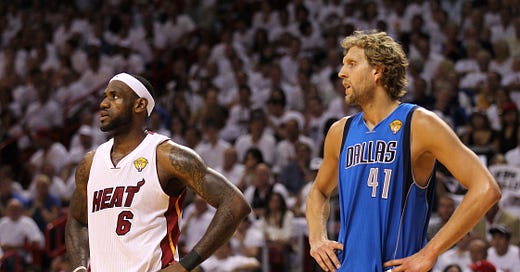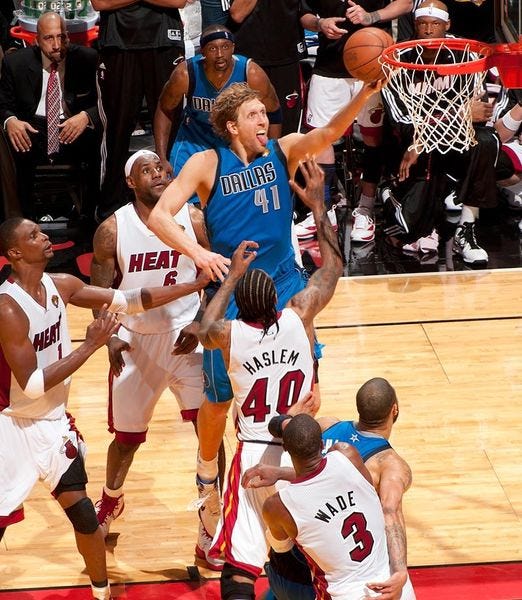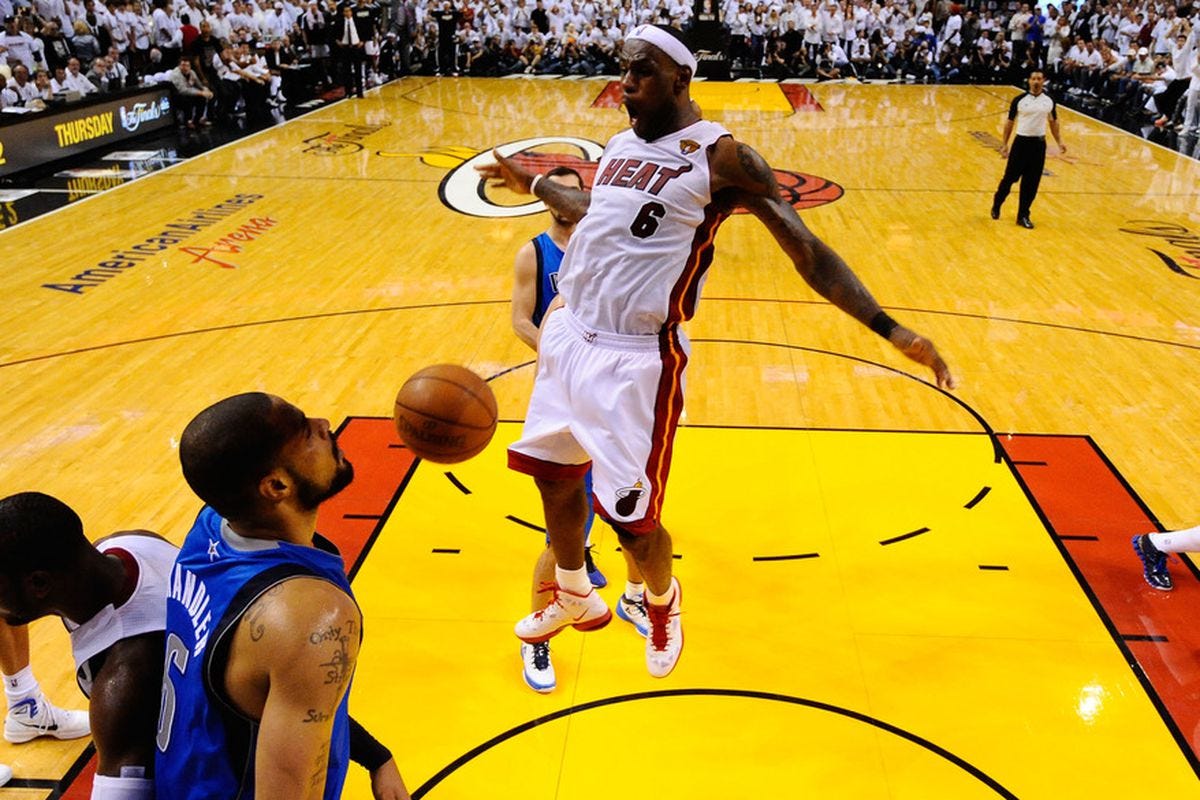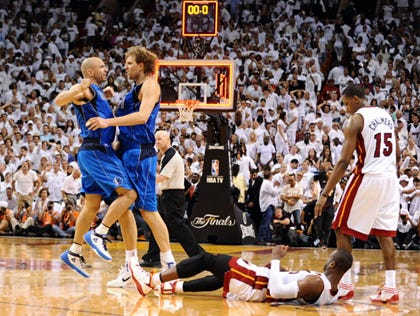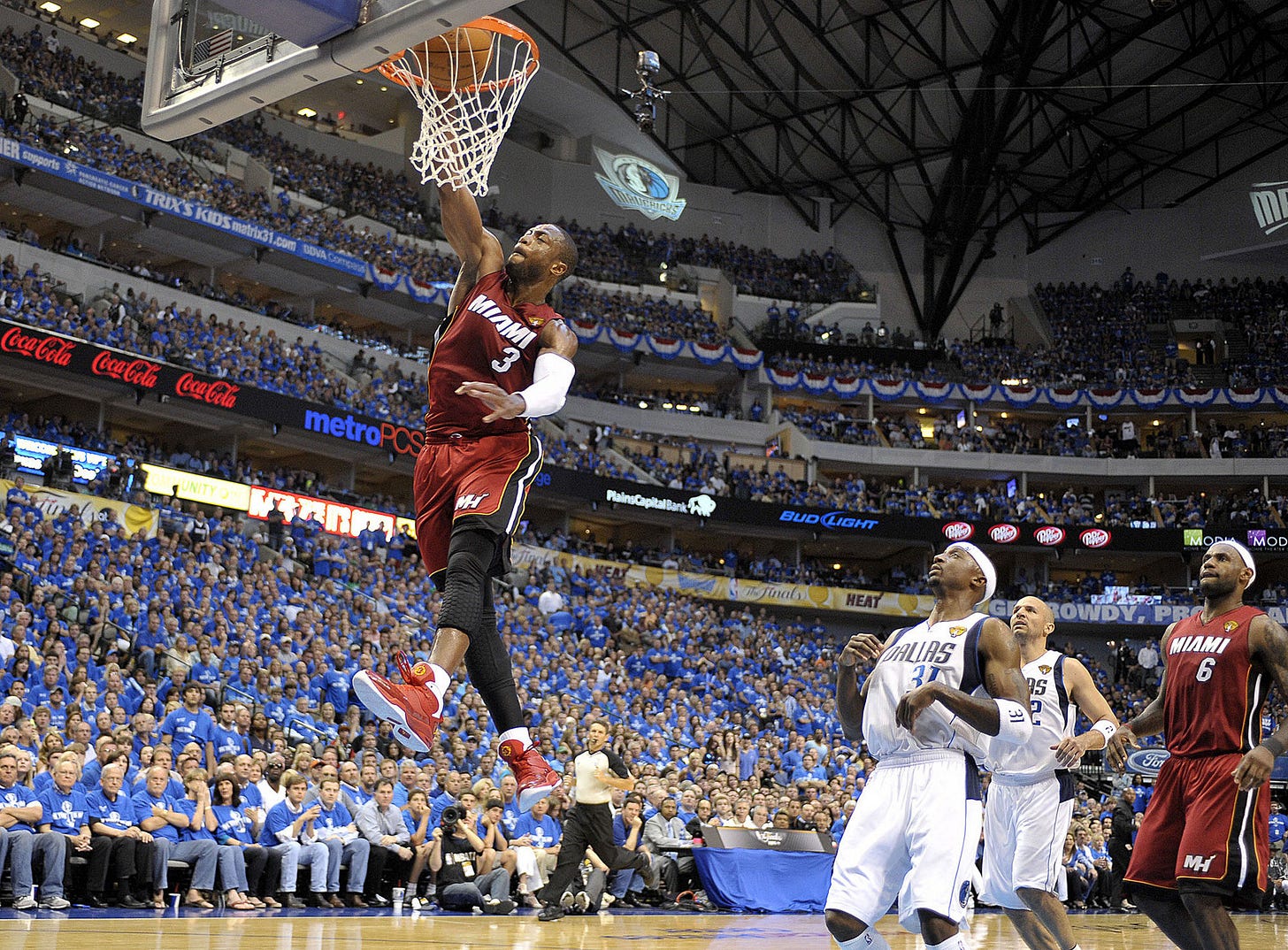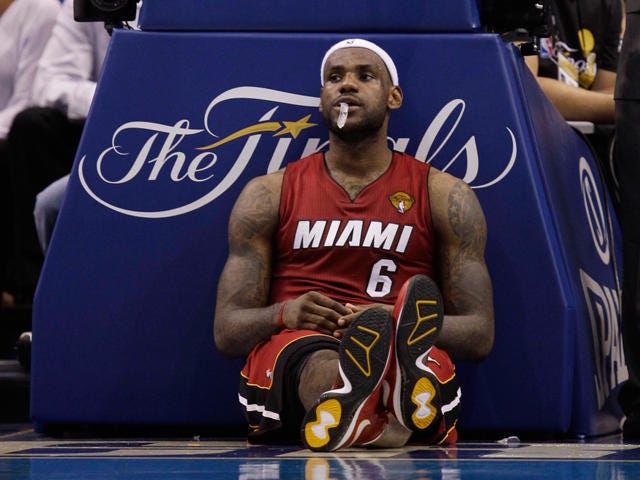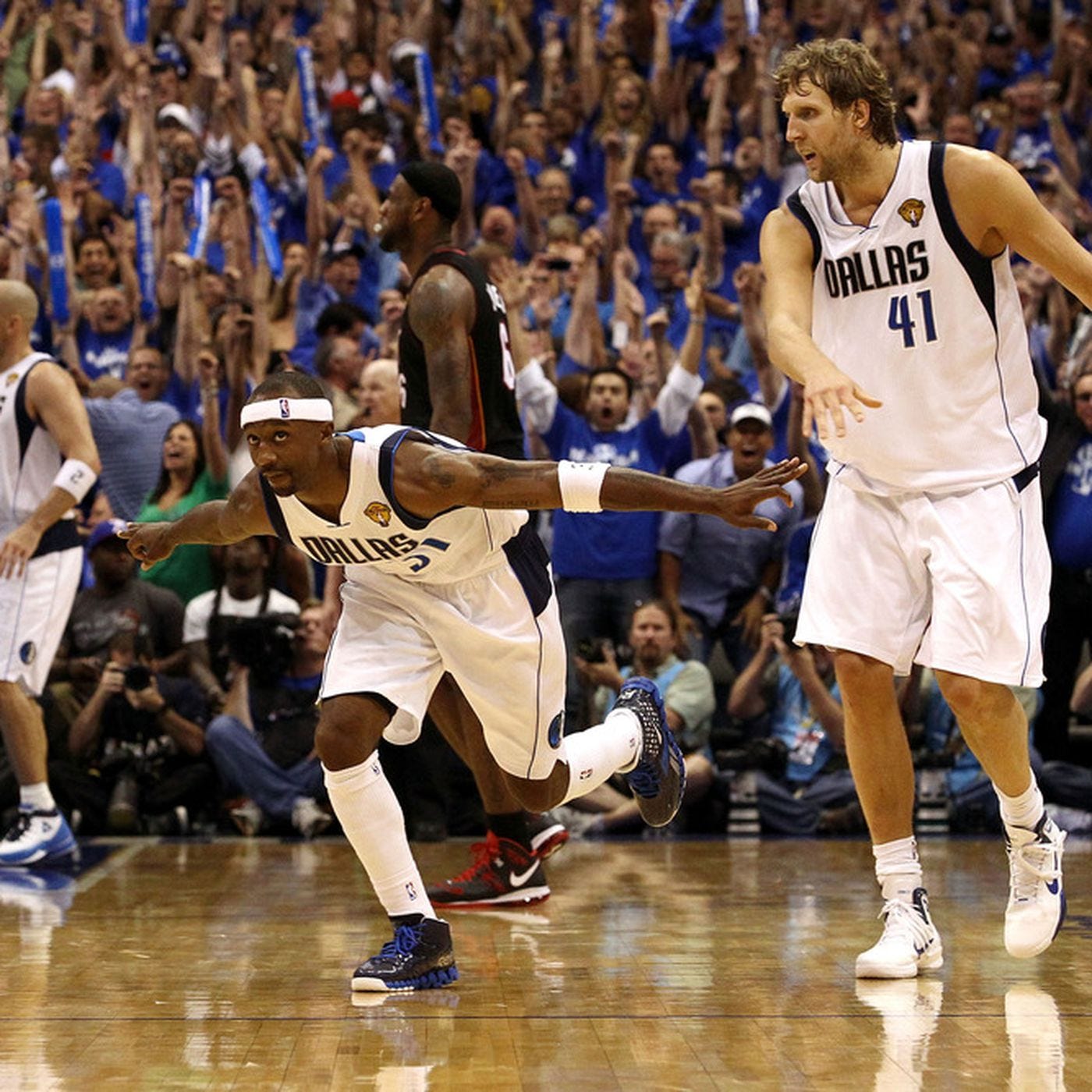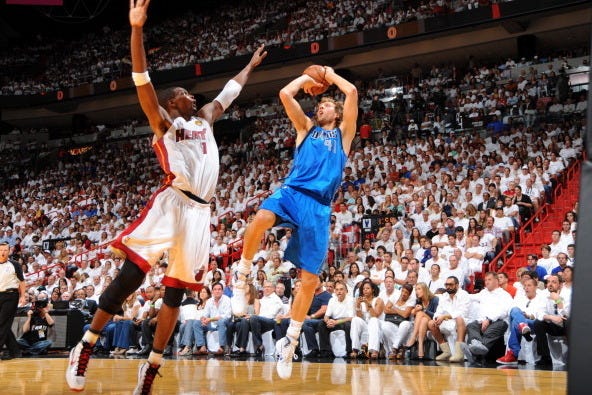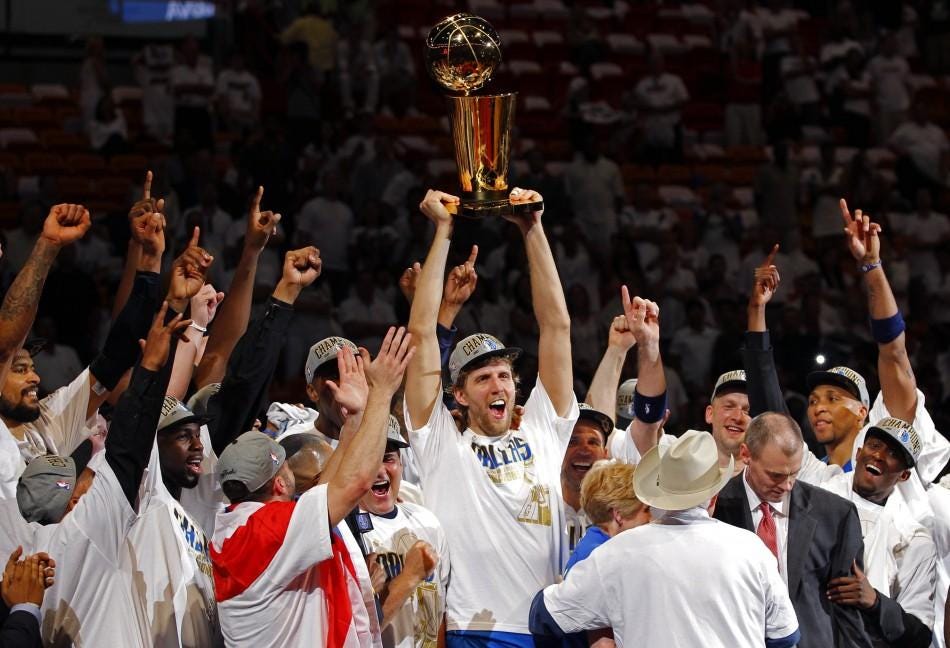2010s NBA Finals, Ranked: 3
Looking back at the 10 NBA Finals played during the 2010s, I bring you the fifth of a seven-part series where I rank them
I’ll be honest: I looooove the 2010s decade of NBA basketball. I might be somewhat biased towards it, simply because it’s the period of time in which I got into watching, enjoying and talking about basketball, but it’s still great nevertheless. The amount of all-time greatness we witnessed in it is startling and would take a while to put into words, but those that have been around know how great basketball was during that span.
In terms of talent alone, the decade might go down as the second-best (behind the 2000s), and the historic moments that happened on the basketball court are ones that will live forever. More specifically, the moments we witnessed during some championship series were remarkably great, and deserve their spot in a museum to celebrate basketball's greatest moments. However, since I'm not a museum director, I'll do the best I can to commemorate my favorite decade of NBA basketball and its moments: rank those series.
In appreciation of the 2010s and all those memorable moments it gave us, let's reminisce on the very best matchups (in most cases) each season had to offer: the NBA Finals of the decade. As the series that crowns a champion and acts as a ladder that a player can use to establish himself as one of the best in history, we saw some great series and individual performances during the 10 Finals of the 2010s. With that in mind, let's rank 'em! (because what else are we doing?).
Before I resume my rankings, let’s look over the criteria I used:
Historical Precedent: record(s) broken in series, impact series had on a player’s legacy, and everything else like that.
Competitiveness: number of games in series and margin of said games.
Rewatchability: being able to rewatch the series and enjoy it impartially.
Injuries: key injuries that impacted the result of the series.
This is part five of a seven-part series. You can find part one here, part two here, part three here, and part four here.
Without any further adieu, let’s continue the ranking with the third-best NBA Finals series of the 2010s:
3. 2011: Dallas Mavericks vs Miami Heat (Mavericks won 4-2); MVP: Dirk Nowitzki (26.0pts, 9.7reb, 2.0ast, 0.7stl, 0.7blk on 41.6/36.8/97.8 shooting)
Contrary to what many historical revisionists may state, the Dallas Mavericks weren’t one of the top championship contenders for this season. Yes, they had an excellent regular season, starting their campaign 24-5 (franchise-record start) and finished 57-25, third in the West. Why weren’t they a serious contender? Here’s why: their second-leading scorer (Caron Butler) suffered a season-ending ruptured patellar tendon in his right knee in January, the Mavs had a history of playoff failures after great regular seasons, and there were more contenders than them (the young OKC Thunder, a Lakers team in search of a three-peat, the Spurs, Bulls with MVP Derrick Rose, and the Heat and Celtics with their respective Big Threes.
Heck, they showed early signs of potential choking after blowing a 23-point lead in the second half of Game Four vs Portland in the first round, getting outscored 15-35 in the fourth in what is now known as Brandon Roy’s last great moment in the NBA. But alas, they ultimately won the next to close it out, and faced who many saw as the team that was supposed to beat them in the Lakers. LA lost a close one in Game One after entering the fourth quarter up 78-71 (largest lead in the game: 16pts) and getting outscored 25-16 in the final period; Kobe dominated with 36pts (15 in the third), but Dirk’s 11pts in the fourth quarter (including the game-tying and winning free throws in the final seconds) capped off a 28pts/14reb outing and a come-from-behind Dallas win on the road.
It was valid to think that it was a game the Mavs simply stole and that the Lakers could bounce back. And the series really wasn’t close after that, but not in the way most thought: Dallas would win three in a row, two of them by double figures and all of them by more than five. Game Two was relatively close entering the fourth, but a huge fourth period by J.J. Barea (8pts/2ast in the quarter) helped lead Dallas to a 2-0 series lead. Los Angeles again had a lead (72-66) entering the fourth, but Peja Stojakovic and Dirk combined for 20pts in the period (Lakers as a team scored 20) to lead a Mavs comeback. Their red-hot shooting would carry over as they would make 20 threes in Game Four, scored 122pts and had 86 of those from their bench (Terry had 32, Barea had 22 with 8ast, and Peja had 21). Needless to say they blew out the Lakers (122-86) to sweep the defending champs.
So, everyone was rightfully surprised, and it was time to reevaluate things: the Mavericks were legit. The Thunder, winners of 55 games and who were one year away from making the Finals, also looked legit. And this series was much more legit than what I remembered. Game One featured the highest margin of victory of the series, it being a nine-point Mavericks win, and a sensational duel between Kevin Durant (40pts/8reb/5ast/1stl/2blk on 10-18/2-5/18-19 shooting) and Dirk Nowitzki (48pts/6reb/4ast/4blk on 12-15 from the field and 24-24 on free throws).
The Thunder would tie the series at one in Game Two, but it was all Dallas after that: a collective effort got them a six-point win in Game Three, another Dirk 40-bomb got them a 3-1 lead, and a 14-point fourth-quarter from Shawn Marion and a 26pts/9reb performance from Dirk helped them close out the series in five.
The Mavs were a complete squad in which various players helped in their success: Dirk was the captain of the ship, Terry was one of the best sixth men in the NBA, Kidd was one of the best floor generals in history (even as the veteran of the squad), Marion and Chandler were the best defenders, and Barea, Stevenson, Stojakovic and the rest of the supporting cast were all key at different points of their postseason run. Even with that, they entered the Finals as the underdog against South Beach’s finest juggernaut.
After winning their franchise’s first championship in 2006 against Dallas (ironic), the Heat went through multiple seasons without significant success, losing in the first round three times in four years (they missed the postseason in 2007-08). However, that all changed when they made one of the most transcendent free agency signings in sports history, acquiring LeBron James to form a Big Three with Dwyane Wade and (also newly signed) Chris Bosh.
The Heat had all the expectations in the world to dominate the NBA for the foreseeable future. This sentiment was intensified when they had their big summer party to celebrate the signings, in which LeBron stated Miami would win “not one, not two, not three, not four, not five, not six, not seven…” championships. They were stacked, they knew it, which made them the villains of the league, something they embraced.
Despite their 10-8 start to the 2010-11 campaign, they were able to figure it out, winning 58 games and finishing with the second-best record in the East behind the Bulls. They gentleman-swept the 76ers in round one and then faced Boston in round two. It was the perfect stage for LeBron, who had joined Miami to beat the Celtics, to shine. And shine he did: he had 35pts in Game Two to help Miami take a 2-0 lead (followed Wade’s 38pts in Game One), a 35pts performance in Game Four (along with a fantastic performance in general by the Big Three), and scored 35pts in Game Five, which included a 10-0 run on his own to end the series in a storybook ending.
In the Eastern Conference Finals, they faced a Bulls team that had a better record than them, dealt with injuries for most of the season, and featured the MVP, Derrick Rose. It looked like it was Chicago’s time to compete, especially after blitzing Miami in Game One. However, the Heat bounced back to win three straight to go up 3-1, and close it out in the United Center in Game Five with a remarkable comeback down the stretch; down by 12 with a little under four minutes left in the fourth quarter, LeBron James and Dwyane Wade went on a 17-4 run to give the Heat a one-point lead with 29 seconds left. Two Chris Bosh free throws and a LeBron block on a Rose three-point attempt later, and Miami had run the gauntlet in the East, and were four wins away from winning one of many championships.
The Mavs and Heat would face off yet again in the Finals, with Dallas looking to even out the score after Miami won the first encounter in six games. The Heat were the clear-cut favorites to win it all, had dominated everybody, and were all healthy. There were no excuses if they didn’t come away as champions. The Heat started off well by taking a 1-0 lead at home behind their Big Three’s performance as LeBron (24pts/9reb/5ast), Wade (22pts/10reb/6ast) and Bosh (19pts/9reb) led the way.
They were about to take a 2-0 lead after having a 15 point advantage with less than seven minutes left in the fourth quarter. But Dallas, as they had done all season, kept fighting; the Mavericks cut the deficit to four with three minutes remaining and tied the game at 90 with less than one minute left after a 17-2 run. They took a 93-90 lead after a Dirk three with less than 30 seconds left, but Miami stayed in it by tying it at 93 with a wide-open corner three.
Dirk put on his superhero cap again to give Dallas a 95-93 lead with a driving lefty layup with 3.6 seconds remaining. Without timeouts, Wade couldn’t hit a half-court heave to win, and Dallas completed one of the greatest comebacks in playoff history to give Miami their first home loss of the postseason and tie the series at one game apiece. Wade scored 36pts with 5reb and 6ast in a lost cause, while Nowitzki (24pts *9 in the fourth quarter* and 11reb), Shawn Marion (20pts/8reb) and Jason Terry (16pts *8 in the fourth quarter* and 5ast) led the Mav’s attack.
Miami took a 2-1 lead with a 88-86 victory in the first of three in a row in Dallas. They were up for most of the contest, but Dallas rallied thanks in large part to Nowitzki’s 24 second-half points. Miami stopped him in the final two possessions though, forcing him to turn it over after doubling him and to miss the game-tying shot at the end of the ballgame. Wade scored 29pts/11reb in the victory and Dirk had 34pts/11reb; Bosh and Wade (7pts each in the quarter) responded to close out the game.
Dallas responded by tying the series with a 86-83 win in Game Four. The Heat had a nine-point lead with 10+ left in the fourth, but Dallas battled back in the period behind the performances of Dirk (10pts/5reb in the quarter) and Terry (8pts in the quarter). In the end, Nowitzki hit a layup to put Dallas up by three, a lead they wouldn’t surrender en route to a 86-83 victory. While Dirk was clutch (again!), LeBron disappeared in the fourth quarter, going scoreless while attempting only one shot in a game where he was quiet (8pts/9reb/7ast on 3-11 shooting).
Criticism poured in for LeBron and company for not dominating and especially when Wade and him mocked Dirk’s sickness prior to Game Five. LeBron had to have a game where he was the clear best player on the court (at minimum in his team), and the Heat needed to take back the lead in the series. None of these scenarios would play out.
Dallas was up for most of the second half in Game Five, with their biggest lead being seven points in the third and fourth quarters. Miami was resilient, going on a 15-7 run to take their first lead of the second half, 96-95 (which they extended to 99-95). The Mavs, however, went on a 17-4 run after that to close the game, 112-103 final score, and take a 3-2 lead.
LeBron, yet again, disappeared in the final 12 minutes of action: scored 2pts (1-4 shooting), and with the game still close he missed two jumpers and turned it over after an offensive foul; his only points of the period came with Miami down by seven with 30 seconds left. Dirk (29pts *8 in the fourth* and 6reb on 9-18 shooting) and Terry (21pts *8 in the fourth* and 6ast) lead Dallas again, with J.J. Barea playing a stellar second half (14 of his 17 came in the half).
Facing gigantic adversity with the potential of losing the series in their home court, Miami got out of the gates on fire, taking a 20-11 lead in the first six minutes of action with LeBron (9pts/2ast on 4-4 shooting) leading the charge. But Dallas, as they had done all year, kept fighting: they went on a 12-2 run to take the lead, winning the period 32-27. The Heat answered a Mavs’ rally at the start of the second quarter with a 16-1 run to take a 44-41 advantage, but Dallas still had a lead at the half, 53-51, behind the performance of “The Jet” (19pts on 8-10 shooting), despite Dirk’s struggles (3pts on 1-12 shooting).
They went on to take the third, 28-21, in order to head into the last period up 81-72 behind Dirk’s bounce-back period (8pts on 3-7 shooting in the third). Dirk Nowitzki and Jason Terry had been in this scenario before: they had a golden opportunity to go up 3-0 in the 2006 Finals in that same building after taking a lead into the fourth, but blew it, lost that game and the next three to end their season in defeat.
With the possibility of a Game Seven in enemy territory looming, the Mavs’ captains that had closed out the previous two games knew what was at stake. And on their second shot to secure a championship, they made sure that this wouldn’t be another chapter written in the book of Mavericks’ postseason failures.
Terry (6pts in the fourth) and Dirk (10pts on 5-8 shooting in the fourth) played the entire period and closed out the series. They both alternated jumpers in consecutive possessions to go up by 11 with 1:55 left to play, and Nowitzki put the nail in the coffin with a layup with 29 seconds left to give Dallas a 103-92 lead (the final score was 105-95). This time, LeBron played well in the fourth quarter (7pts on 3-5 from the field), but it was too late. With this, the Mavericks finally did it: they won their first championship in franchise history, in the process completing one of the greatest postseason runs for any team in NBA history.
In terms of affecting legacies, this series had an immense impact on both sides of this equation: the Mavs finally ended their legacy of postseason misery with a championship, in the process defeating three straight contenders, eight future/current All-Stars and five MVP-caliber players. Dirk Nowitzki finally got a ring to validate all of his achievements, one that is now remembered as one of the greatest championship victories by a single superstar. The Heat, with their loss, became the joke of the league.
With all of this said, however, this series undoubtedly had the biggest impact on LeBron James; to say it was a bad series for him would be a grave understatement. Of course, James averaged 17.8pts/7.2reb/6.8ast/1.7stl/0.5blk on 47.8/32.1/60 shooting. Those are solid numbers, but they don’t tell the full story about the impact this series had on the “Chosen One”...
LeBron spent the first seven years of his career with a Cleveland Cavaliers franchise that could never properly surround him with the adequate talent to win a ring, he left them to form what was considered at the time the best Big Three in NBA history (hello Brooklyn), was the one who bragged the most about being on a great team, became public enemy #1 around the league, mocked the opposing team’s star when he was sick, his team had a lead in a Finals they were the clear favorites to win, and what did he do? He disappeared in two straight fourth quarters and was the worst of his team’s Big Three while they lost three straight to end their season. Even if Miami won the series, the Finals MVP would’ve been Dwyane Wade (26.5pts/7.0reb/5.2ast/1.5stl/1.5blk on 54.6/30.4/69.4 shooting in the series).
LeBron James is a great player, but even with all the awards, records, praise and positive aspects to his legacy, this series is, and will continue to be, the main argument against him being the GOAT. This is one of the worst performances by a superstar on a big stage in sports history. It’s the lowest level LeBron James has ever sunk to in his professional career. But, oddly enough, it’s also the best thing that could’ve happened to him…
Yes, it ruined his legacy and it’s the biggest reason why Michael Jordan will have a better legacy than him, but it’s precisely this failure what also makes LeBron’s redemption arc that much better: without his failure in the 2011 Finals, his dominance the next season (starting with a blowout win on Christmas Day vs the team they lost to in said series) doesn’t hit the same. Without that failure, his performance in Game Six of the Eastern Conference Finals the next season at Boston doesn’t carry the same significance.
Without that failure, his first championship wouldn’t have had the sweet taste it did. Without that failure, his performances in the final two games of the 2013 Finals, with his team down 3-2, wouldn’t have the value it does outside of being great clutch performances. Without that failure, his performances in the last three games of the 2016 Finals against Golden State wouldn’t hold the same weight it now does in his legacy. Without that failure, the legacy of LeBron James wouldn’t be looked at the same way, for better and for worse.
While this series may be the kryptonite in his argument to be the GOAT, it’s also what makes all his other achievements seem bigger than what they could’ve been if the result of this series had been different. It was the furthest LeBron ever fell, what motivated him to get back up stronger than ever, and the moment where we all became witnesses to one of the greatest careers in NBA history.
Also, it was the last time we saw Dwyane Wade playing at a superstar level before he handed the keys to the team (for good) to LeBron and all the nagging injuries hit him, it gave Dirk Nowitzki one of the most respected championships in sports history, and it was more than a chapter in the history of Miami’s Big Three: it was the last chapter in the history of Dirk’s Mavs, one in which, in spite of previous failures, they could defeat the biggest collection of individual talent a team has ever gone through in a postseason run to finish the adventure they nearly completed five years earlier.
Besides affecting legacies, this series was extremely competitive: the last game was the only one to be decided by double digits, and three straight (Game Two through Four) were decided by one possession. Both teams had leads in the series and big leads in some games, and both squads blew leads and made rallies during the course of the six-game affair. Bonus to the fact that there were no key injuries that impacted it (Wade and Nowitzki had injuries, but neither missed any action because of it)... what happened here doesn’t merit any excuses on either end.
This series deserves to be in the top four of my rankings with just the impact it had on legacies. And when you had the competitiveness it had throughout and the fact there were no injuries that changed the outcome, it belongs in the top three. Having said that, it’s still missing that iconic/memorable game; not an individual moment (Dallas’ comeback in Game Two, for example), rather a complete game that will remain ingrained in basketball lore. It’s missing that game that survives the test of time and that could be in the conversation for the greatest NBA game ever, something that both of the Finals ahead of it have.
This series was about creating a new narrative centered around LeBron that would, directly and indirectly, shape the entirety of the next decade of basketball. But this wasn’t the start of the decade; although it was the first one to define LeBron, which would, in turn, shape the next seven Finals series, the first Finals series of the decade was an ending to a great story; the end of an era, if you will. At the moment, the Finals prior to 2011 was the last we saw of its great teams and players at the peak of their powers, performing at the grandest stage. They all took the first year of the 2010s decade to revisit the past, put a bow on their story with one another, and in turn gave us an amazing series.
More on that in part six of this ranking, which can be found here

